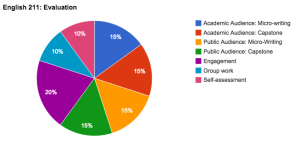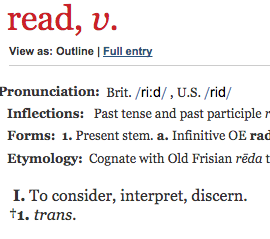English 211: Academic Writing about Literature
When Literature is Digital
Section F04, CRN 35065
Tues/Thurs 11:30-1:00, Gruening 204
Instructor: Kendell Newman Sadiik
Office hours: 11-11:30 & 1-1:30, Tues/Thurs
Prerequisites: ENGL-111x or placement exam
Course [Catalog] Description:
This course provides instruction in critical reading and writing by examining academic questions from the perspective of rhetorical situations. The course concentrates on the research methods and techniques necessary to create extended written arguments and multimodal texts for a variety of audiences.*
When Literature is Digital,
we arrive at one (of many) boundary zones / frontiers of “literature.” CAN literature be DIGITAL?
a writer is faced with a whole new set of choices when it comes to communicating an idea. He might use images. She might create hypertext. They might compose with animation, with sound, with social media. The CHOICES that the writer can make have expanded. How do we choose how we communicate?
it means reading by its first definition (1.) rather than its second (2.). It means a new relationship between reader and writer: reader <-> text <-> writer rather than writer -> text -> reader. It means upsetting our expectations.
Course Re-Description:
This course is an opportunity to collaboratively explore the boundaries of reading, writing, academic inquiry and discourse. The course is critical of convention because it wants to ask: What other choices do we have, as readers, writers, learners, citizens?
Course Goals:
This course aims to develop your agility, motivation, and confidence as a writer and member of communities across digital, non-digital, academic and public spheres. By the end of the course, students will be able to:
- [critical reading] Select and synthesize information from multiple perspectives, genres, and audiences.
- [critical writing] Design effective texts in response to changing audiences, contexts, and purposes.
- [critical thinking] Assess their choices as writers.
Logistics:
In a course about digital writing, we’ll be pushing ourselves to explore and experiment with digital modes of writing, reading, thinking, and communicating. This website will be our main means of communicating outside of the classroom. Student assignments will be submitted either directly to this site via our class blog, or in some cases, to Google Drive [specifically, this folder]. Note that these digital submission options come with digital composing options. What new choices become available when you compose in Google Drive (docs, slides, drawings, forms …?) or in a WordPress blog window? Let’s push the boundaries of these forms.
Deadlines … Ought to be reasonable. If you anticipate having a problem meeting one of our deadlines, talk to me in advance (i.e. at least 3 days before the due date). I am usually happy to negotiate an extension. Otherwise, I do not accept late work.
We will explore new digital spaces AND tools together throughout the semester. One tool that is likely to be handy for responses to digital texts is Jing, a free app that will allow you to annotate and share screenshots and screencasts with our class. Please download Jing and familiarize yourself with how it works.
Have ideas about other useful tools and ways to push the boundaries of how we collaborate in this class? Post about it on our blog, bring it up in class, experiment with it in your own work for the course. This is a collaborative space.
Required Texts:
Pry, A Novella — Free Download on iTunes store
Gone Home — Download ($19.95)
Policies:
The policies that guide this class are rooted in an expectation of RESPECT. Our classroom is an experimental space: we’re all learning, and this requires that we ask questions, try out new ideas, take risks, FAIL, and come to new insights individually and together. You are encouraged to experiment with your ideas, with your writing, and with your citizenship as part of our classroom community. You are expected, also, to offer patience, attention, and respect to your classmates as they test new ideas.
Attendance:
Technology:
Most of the work we do in this course will require the use of computers, tablets, phones, and other devices. You are encouraged to use these technologies in the class for the sake of advancing our discussions and learning. Please DO NOT text, check your social media, or otherwise use our class time for your personal digital life. I consider this extremely disrespectful.
Evaluation:
Our class will assume a workshop format, with in-class discussion and activities as well as regular reading and writing assignments outside of class. Each of our two major units (“Academic Audience” and “Public Audiene”) will culminate in a “capstone’ project, with a series of “micro-writing’ assignments leading up to the capstone. I will distribute specific information about each assignment as appropriate.
Your final grade will be calculated according to the following:
Engagement refers to your attendance, participation, and effort in this class. You can engage in this class by:
- Attending class regularly, arriving on-time and prepared;
- While in class, focusing your attention on the class activities and discussions;
- Offering verbal and/or written contributions to class conversations;
- Making an effort to use all the resources available — including my office hours and the Writing Center — for help outside of class.
Group work: Throughout the semester, we’ll be working in small groups on a variety of projects both in and outside of class. Group work comes with its own set of challenges, which we will recognize and work through together.
Self-assessment: At the end of the semester, I will ask each of you to give yourself a grade for the course. I’ll distribute more information and instructions on this process later in the semester. But it will be important to keep in mind, throughout the semester, that you will have to take a critical, honest look at your own effort and performance in this class. You’ll want to be proud of your work.
Extra Credit: You can earn extra credit — worth the equivalent of one percentage point on your final grade — for doing a tutorial at the Writing Center or attending writing-related events in the community. For Writing Center credit, you must work with a tutor on an assignment for this class. To receive credit for attending an event, please write up a one-page reflection on your experience (Did you learn anything? What was interesting or disappointing? Was it what you expected?).
Academic Honesty:
Your academic honesty is assumed, which means that I expect all of your submitted work to have come from your brain and your hand. If you’ve submitted the work of someone else, in whole or in part and without proper citation, I will not accept the assignment. Within academic communities, plagiarism represents a serious breech of trust and can carry severe consequences, including disciplinary action. With that in mind, we’ll go over the proper ways of summarizing, paraphrasing, quoting, and citing your materials so you can avoid pilfering information, even accidentally.

